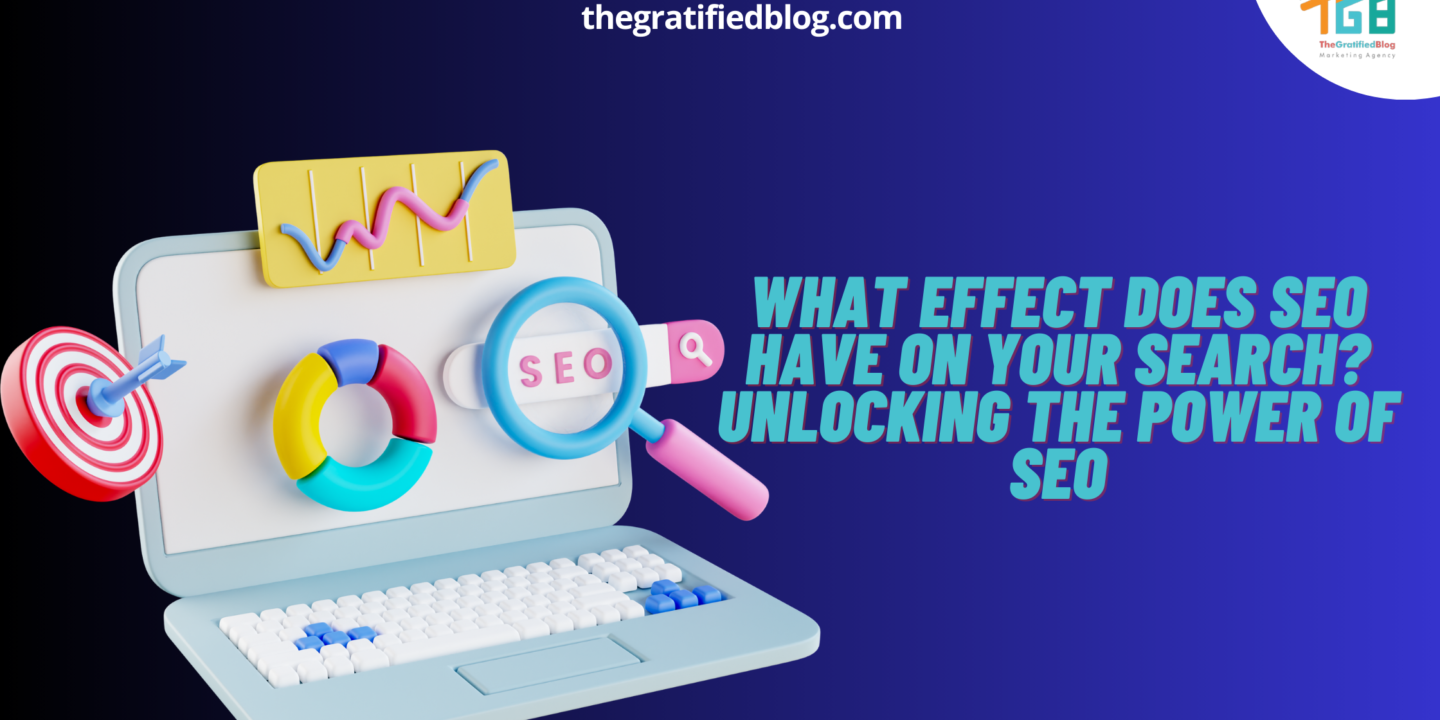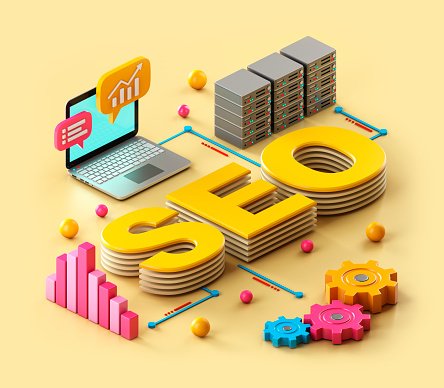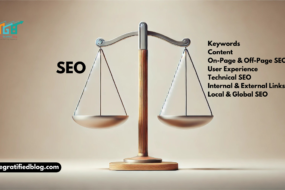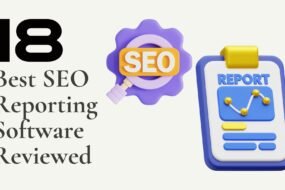
What effect does SEO have on your search? In the modern digital age, the internet has become an indispensable aspect of our daily lives. Whether seeking information, engaging in online shopping, or connecting with friends and family via social media, we rely on search engines to traverse the vast expanse of the web.
Search engines such as Google, Bing, and Yahoo have revolutionized how we access information, making finding what we’re looking for more accessible.
But have you ever wondered how these search engines decide which websites to display at the top of their search results? The answer lies in the complex world of search engine optimization (SEO).
Integral to online marketing, SEO influences a website’s presence in search engine results. It’s a multifaceted strategy that optimizes various website components for increased visibility on Search Engine Results Pages (SERPs).
This article will explore the effect Of SEO On your search. Unlock The Power Of SEO and the profound impact of SEO on your online search experience, uncovering the power it holds in shaping the digital landscape.
Understanding The Basics Of SEO
Before we delve into the effects of SEO, it’s essential to grasp the fundamental principles of this digital marketing strategy. SEO encompasses various techniques and practices to enhance your website’s visibility and positioning on search engines. These practices can be broadly categorized into on-page and off-page SEO.
On-Page SEO: This focuses on optimizing the content and structure of your website itself. It includes keyword optimization, meta tags, headings, URL structure, and content quality.
On-page SEO ensures that your website is user-friendly and provides valuable information to your visitors.
Off-Page SEO: On the other hand, off-page SEO encompasses external activities to improve your website’s authority and reputation. This includes building high-quality backlinks from reputable sources, social media marketing, and online reputation management.
Off-page SEO helps search engines recognize your website as a trustworthy and credible source of information.
Unlocking The Power Of SEO

Now that we have explored how SEO affects search results, it’s time to unlock the power of SEO for your website or business.
SEO is dynamic in that sustaining relevance and practicality necessitates ongoing effort and adaptation. Here are some key strategies to help you maximize the impact of SEO on your online presence:
1. Keyword Research: Perform comprehensive keyword research to discover the terms and phrases that resonate with your target audience. Search for Leverage keyword research tools to find keywords with substantial traffic and low competition. Relevant to your content or business.
2. On-Page Optimization: Optimize your website’s on-page elements once you have your target keywords. This involves incorporating keywords and meta titles, descriptions, and headings into your content. Ensure that your content provides value and answers the questions or needs of your audience.
3. Quality Content: High-quality content is the backbone of successful SEO. Regularly create informative, engaging, and relevant. Create material that speaks to the needs and interests of your intended audience. This will attract more visitors and encourage them to stay longer on your site.
4. Link Building: Build high-quality backlinks from reputable websites in your niche. These incoming links signal to search engines that your website is a trustworthy and credible information source. However, avoid spammy or low-quality backlinks, which can harm your rankings.
5. Technical SEO: Ensure your website’s technical aspects are in good shape. This includes optimizing your site’s speed and mobile responsiveness and fixing broken links or crawl errors. A technically sound website provides a better user experience.
6. Local SEO: Optimize your business from a specific physical site for local search. Create a Google My Business listing, encourage customer reviews, and ensure your business information is consistent across online directories.
7. Social Media Presence: Engage with your audience on social media platforms. Sharing content and interacting with followers can improve your website’s visibility and authority.
8. Analytics and Monitoring: Implement a website that utilizes analytics tools like Google Analytics to observe the effectiveness of your website. Regularly review your data to identify improvement areas and monitor the impact of your SEO initiatives.
9. Stay Informed: SEO is constantly evolving, with search engines regularly updating their algorithms. Stay informed about industry trends and algorithm changes to adapt your SEO strategy accordingly.
10. Patience and Persistence: SEO is not a quick fix; it’s a long-term strategy. It may take time to see significant results, but persistence and dedication to best practices will ultimately pay off.
What Effect Does SEO Have On Your Search?

Now that we understand what SEO entails let’s explore its profound effects on your online search experience.
1. Improved Search Rankings
The most apparent impact of SEO is its ability to boost your website’s search engine rankings. Upon optimizing your website for particular keywords and following best practices, search engines are more likely to recognize your site as a relevant source of information.
As a result, your site climbed in search rankings, increasing its visibility to users. Higher search rankings mean that your website is more likely to be clicked on, as most users are inclined to click on one of the initial results. On the SERPs.
This increased visibility can result in substantial organic (unpaid) traffic to your website, helping you reach a broader audience.
2. Enhanced User Experience
Effective SEO goes beyond keywords and content. It also involves optimizing your website’s structure and user experience.
By improving site navigation, ensuring fast loading times, and making your site mobile-friendly, you provide a better experience for your visitors.
A website with straightforward navigation is more prone to retaining visitors and motivating them to explore further. This helps reduce bounce rates and increases the chances of users converting into customers, subscribers, or engaged readers.
SEO indirectly contributes to a positive user experience and user satisfaction.
3. Credibility And Trust
When your website consistently ranks well in search results, it conveys to users a sense of authority and trustworthiness. Many people believe that websites appearing at the top of search results must be reliable sources of information.
This perception can be a powerful asset, especially for businesses and content creators, as it instills confidence in your brand.
Building credibility and trust through SEO is a long-term endeavor. Consistently providing valuable content, engaging with your audience, and maintaining a solid online presence are all essential aspects of this process.
Over time, as users associate your website with quality information, your credibility and trustworthiness will grow.
4. Increased Organic Traffic
One of the most significant benefits of SEO involves generating organic traffic for your website, where visitors come through search engine results instead of paid advertisements.
This type of traffic is precious, as it often consists of users actively seeking information, products, or services related to your website’s content.
In contrast to paid advertising, which may incur high costs and offer only short-term results, organic traffic generated through SEO is sustainable and cost-effective.
As your website’s authority and search engine rankings improve, the flow of organic traffic will persist in growing, ensuring a consistent flow of potential customers or readers.
5. Targeted Audience
With SEO, you can focus on a particular audience based on their search intent. When you optimize your website for specific keywords, you tailor your content to match what users seek.
This means that the visitors your website attracts through SEO are more likely to be interested in your content, products, or services.
For example, if you run an online store selling sports equipment and optimize your website for keywords like “best tennis rackets,” you are more likely to attract users interested in purchasing tennis equipment.
This focused strategy has the potential to result in increased conversion rates as you align your website with your potential customers’ needs and interests.
6. Competitive Advantage
In today’s competitive online landscape, having a well-executed Implementing SEO strategy can provide you with a notable edge.
In the absence of SEO investment by your competitors, or if they need to do it effectively, you can secure a more significant portion of the market.
On the other hand, staying competitive in this space becomes crucial if your competitors are actively engaged in SEO.
SEO is an ongoing process, and paying attention to it can result in losing visibility and potential customers to your competitors.
7. Local SEO And Physical Businesses
Local SEO is a crucial game-changer for businesses with physical addresses. Optimizing for local search allows your business to appear in local search results and on map services.
When individuals look for products or services within their vicinity, they are more likely to visit or contact businesses quickly discoverable through local SEO.
For instance, if you have a restaurant in New York City, enhancing your website with keywords such as “best pizza in NYC” or “Italian restaurant in New York” can attract customers looking for dining options in your area.
Local SEO strategies boost your visibility in local search results. such as setting up a Google My Business profile and garnering online reviews,
8. Measurable Results
One of the strengths of SEO is its measurability. Various tools and analytics platforms allow you to track the performance of your SEO efforts. You can monitor your website’s rankings, organic traffic, conversion rates, and more.
These insights from the data offer valuable information about how effective your SEO strategy is, allowing you to make informed decisions and adjustments as needed.
Measuring results is a significant advantage of SEO compared to conventional advertising methods like print or TV ads, where it can be challenging to accurately assess the impact of your marketing efforts.
9. Adaptation To Algorithm Changes
Search engines consistently refine their algorithms to offer users the most relevant results. Users with the best search experience. While these algorithm changes can present challenges for website owners and SEO specialists, they also offer opportunities.
You can sustain and potentially enhance your search rankings by staying informed and adapting to these changes.
SEO professionals closely follow search engine algorithm updates to understand how they impact search results.
By staying informed and adapting your SEO strategies consequently, you can guarantee the ongoing relevance of your website. Relevant and competitive in the evolving online landscape.
10. Cost-Effective Marketing
In contrast to conventional advertising approaches, SEO is a cost-effective marketing strategy. Despite the initial investment it demands, the prolonged benefits often outweigh the costs.
Paid advertising methods, like pay-per-click (PPC) campaigns, have the potential to deplete your budget quickly and may not provide sustainable results.
In contrast, the results of a well-executed SEO campaign can endure for an extended period, providing a high return on investment (ROI).
Over time, the organic traffic generated through SEO can significantly reduce your reliance on paid advertising, saving your business money in the long run.
Challenges And Considerations
While the positive effects of SEO on your online search experience are apparent, it’s essential to acknowledge the challenges and considerations associated with this digital marketing strategy.
1. Ongoing Effort
SEO is not a singular undertaking but a continual process. Search engines consistently refine their algorithms, and the competitive online landscape demands consistent attention and adaptation.
Remaining updated on the most recent SEO trends and adhering to best practices is essential to maintaining and improving your website’s visibility.
2. Time And Patience
The results of SEO efforts may take time. It can take time for search engines to recognize and reward your optimization work. Building trust and authority in the online space is a gradual process. Patience is key in SEO; you may see significant results for only a few months.
3. Algorithm Uncertainty
Search engine algorithms are closely guarded secrets that can change without warning. This uncertainty can make predicting how algorithm updates will impact your website’s ranking challenging. However, staying informed and adapting your strategy can help mitigate these challenges.
4. Competitive Landscape
The online marketplace is highly competitive, and your competitors may also be investing in SEO. Standing out and maintaining your search ranking can be a constant battle. Regular analysis of your competitors’ strategies and continuous improvement is essential for long-term success.
5. Ethical Considerations
It’s crucial to engage in ethical SEO practices and avoid tactics that violate search engine guidelines, such as keyword stuffing or buying backlinks. Engaging in unethical SEO can result in penalties, including losing search engine rankings.
FAQ’S
Q1. What Does SEO Have On Your Search?
Ans: SEO is pivotal in determining your online visibility and search engine rankings. It involves techniques and strategies to enhance your website’s performance in search results.
Successful SEO can result in heightened organic traffic, enhanced user experience, and higher credibility for your online presence.
By optimizing your content and website structure, SEO facilitates engagement with your intended audience and stays ahead of the competition. Ultimately, SEO profoundly impacts your digital success and brand recognition online.
Q2. What Effect Does SEO Have On Your Search Quizlet?
Ans: SEO significantly impacts your search visibility on platforms like Google. Firstly, it enhances organic traffic, increasing the likelihood of your content appearing in search results.
Secondly, it boosts the credibility and trustworthiness of your content, making it more likely to be clicked.
Lastly, SEO improves the user experience by optimizing site structure and content, reducing bounce rates, and increasing user engagement. SEO is pivotal in maximizing online presence and directing pertinent, focused traffic to your website or content.
Increased Organic Traffic:
Effective SEO strategies help your website or content attain a higher position on search engine results pages (SERPs), resulting in more clicks and visits.
Credibility And Trustworthiness:
Proper SEO practices can establish your website as a reputable source, increasing user trust and click-through rates.
Improved User Experience:
SEO focuses on keywords, site structure, and the quality of content, resulting in an enhanced overall user experience. And engagement.
Q3. Does SEO Help Make Your Content Searchable?
Ans: SEO plays a crucial role in making your content searchable. By optimizing your content for pertinent keywords and using best practices, you increase its visibility on search engines like Google.
This, in turn, helps potential users find your content when they enter related search queries. SEO techniques such as meta tags, quality backlinks, and mobile-friendliness enhance your content’s discoverability.
SEO is a powerful tool that ensures your content achieves a higher position in search outcomes, rendering it more accessible to your target audience and increasing its chances of being found online.
Conclusion
SEO is a powerful tool that profoundly impacts your online search experience. From improving search rankings to enhancing user experience and driving organic traffic, the benefits of effective SEO are undeniable.
As the digital environment undergoes continual changes, comprehending and harnessing the power of SEO has become necessary for businesses, content creators, and anyone with an online presence.
While SEO requires ongoing effort and adaptability, its long-term results make it a cost-effective and essential component of digital marketing.
Investing in SEO allows you to reach a wider audience, build credibility and trust, and ultimately achieve your online goals. In the ever-expanding digital world, SEO remains a key player in shaping how we search for and discover information online.








No Comments